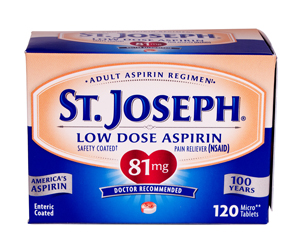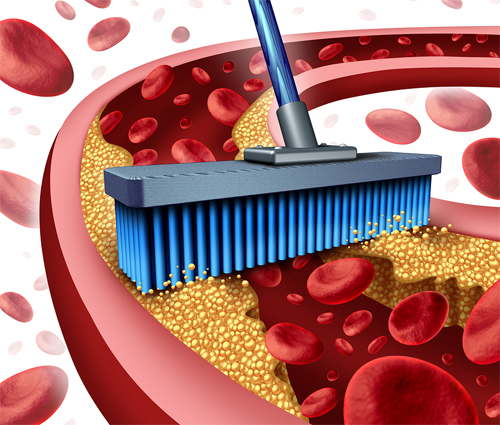The mainstream media is all over the latest study on aspirin and heart disease–like ants on a picnic spread.
Deep sigh. The study, published in the Lancet came to two conclusions: 1 Li, Linxin et al. “Age-specific risks, severity, time course, and outcome of bleeding on long-term antiplatelet treatment after vascular events: a population-based cohort study.” The Lancet , Published online: 13 June 2017. http://www.thelancet.com/journals/lancet/article/PIIS0140-6736%2817%2930770-5/fulltext One of which is worth a, “What took you so long?” The other elicits more of a, “Are you out of your freaking mind?” So, what are these two “mind-blowing conclusions?”
- In patients receiving aspirin-based antiplatelet treatment without routine proton pump inhibitor (Nexium, Prevacid, etc.) use, the long-term risk of major bleeding is higher and more sustained in older patients, with a substantial risk of disabling or fatal upper gastrointestinal bleeding.
- Given that half of the major bleeds in patients aged 75 years or older were upper gastrointestinal, co-prescription with PPIs to prevent such bleeding should be encouraged.
Amusingly, the more lay oriented media almost universally latched onto the first point.
- “Taking a Daily Aspirin Could Be Deadly, Science Says.” Readers Digest.2 http://www.rd.com/health/conditions/aspirin-risk-of-bleeding/
- “Daily aspirin linked to higher risk of bleeding in elderly.” CBS News.3 http://www.cbsnews.com/news/daily-aspirin-linked-to-higher-risk-of-bleeding-in-elderly/
- “Daily low dose aspirin to prevent blood clots ‘may be lethal for some over-75s.” Evening Express.4 http://www.eveningexpress.co.uk/pipe/news/uk/daily-low-dose-aspirin-to-prevent-blood-clots-may-be-lethal-for-some-over-75s-2/
Whereas the medical media, saw fit to lead with the second.
- “Proton-Pump Inhibitors Reduce Bleeding Risk in Antiplatelet Therapy.” The Cardiology Advisor.5 http://www.thecardiologyadvisor.com/stroke/antiplatelet-bleeding-risk-reduced-with-ppis/article/670675/
- “PPIs May Benefit Older Patients on Antiplatelet Therapy.” Monthly Prescribing Reference.6 http://www.empr.com/news/aspirin-proton-pump-inhibitors-bleeding-elderly/article/668688/
Isn’t bias a wonderful thing? Anyway, let’s take a closer look at the study in question to see how we arrived at those two conclusions. And then we’ll explore why I’m less than sanguine about either one of them.
Age-Specific Risks of Long-Term Antiplatelet Treatment After Vascular Events
 Previous studies have estimated that between 40 and 60 percent of people over 75 in Europe and the U.S. take aspirin daily to prevent heart attacks. That’s a lot. It represents, in America alone, some 48.7 million adults who report being on low-dose or baby aspirin.7 Stuntz M, Bernstein B. “Recent trends in the prevalence of low-dose aspirin use for primary and secondary prevention of cardiovascular disease in the United States, 2012–2015. Preventive Medicine Reports.” 2017;5:183-186. http://www.ncbi.nlm.nih.gov/pmc/articles/PMC5219640/ While experts have known for a number of years that daily aspirin carries a risk of internal bleeding–in particular, upper gastrointestinal bleeding8 Huang ES, Strate LL, Ho WW, Lee SS, Chan AT. “Long Term Use of Aspirin and the Risk of Gastrointestinal Bleeding.” The American Journal of Medicine. 2011;124(5):426-433. http://www.ncbi.nlm.nih.gov/pmc/articles/PMC3086018/ –the risk was assumed to be small enough that the U.S. Preventive Services Task Force felt the heart and colon cancer protective benefits outweighed any risk from bleeding.9 “Final Recommendation Statement: Aspirin Use to Prevent Cardiovascular Disease and Colorectal Cancer: Preventive Medication.” U.S. Preventive Services Task Force. November 2016. http://www.uspreventiveservicestaskforce.org/Page/Document/RecommendationStatementFinal/aspirin-to-prevent-cardiovascular-disease-and-cancer (Note: recommendations made by the USPSTF are independent of the U.S. government.) But the implications of long-term use in older people have remained unclear because most clinical trials involved patients under 75. The study just published in The Lancet, however, which examined a total of 3,166 Britons who had suffered a heart attack or stroke and were taking blood-thinning medication over a 10-year period to prevent a recurrence, was split equally between patients both older and younger than 75. And the results were eye opening.
Previous studies have estimated that between 40 and 60 percent of people over 75 in Europe and the U.S. take aspirin daily to prevent heart attacks. That’s a lot. It represents, in America alone, some 48.7 million adults who report being on low-dose or baby aspirin.7 Stuntz M, Bernstein B. “Recent trends in the prevalence of low-dose aspirin use for primary and secondary prevention of cardiovascular disease in the United States, 2012–2015. Preventive Medicine Reports.” 2017;5:183-186. http://www.ncbi.nlm.nih.gov/pmc/articles/PMC5219640/ While experts have known for a number of years that daily aspirin carries a risk of internal bleeding–in particular, upper gastrointestinal bleeding8 Huang ES, Strate LL, Ho WW, Lee SS, Chan AT. “Long Term Use of Aspirin and the Risk of Gastrointestinal Bleeding.” The American Journal of Medicine. 2011;124(5):426-433. http://www.ncbi.nlm.nih.gov/pmc/articles/PMC3086018/ –the risk was assumed to be small enough that the U.S. Preventive Services Task Force felt the heart and colon cancer protective benefits outweighed any risk from bleeding.9 “Final Recommendation Statement: Aspirin Use to Prevent Cardiovascular Disease and Colorectal Cancer: Preventive Medication.” U.S. Preventive Services Task Force. November 2016. http://www.uspreventiveservicestaskforce.org/Page/Document/RecommendationStatementFinal/aspirin-to-prevent-cardiovascular-disease-and-cancer (Note: recommendations made by the USPSTF are independent of the U.S. government.) But the implications of long-term use in older people have remained unclear because most clinical trials involved patients under 75. The study just published in The Lancet, however, which examined a total of 3,166 Britons who had suffered a heart attack or stroke and were taking blood-thinning medication over a 10-year period to prevent a recurrence, was split equally between patients both older and younger than 75. And the results were eye opening.
The risk of disabling or fatal bleeding from taking low-dose aspirin jumps sharply with age.
Disturbingly, the risk of dangerous bleeding jumped sharply with age–and the bleeds were often disabling or fatal. Specifically, the study found that the annual rate of life-threatening or fatal bleeds was less than 0.5 percent in those under 65, rising to 1.5 percent for those aged 75-84 and nearly 2.5 percent for those over 85. Even worse, several previous studies and commentaries have noted that patients on dual anti-platelet therapy (that’s pharmaceuticals plus aspirin) have a higher risk of bleeding than those on monotherapy, which means that older patients, at the very least, require special, regular evaluation.10 Chris Terpening. “An Appraisal of Dual Antiplatelet Therapy with Clopidogrel and Aspirin for Prevention of Cardiovascular Events.” J Am Board Fam Med January-February 2009 vol. 22 no. 1 51-56. http://jabfm.org/content/22/1/51.full , 11 Peter B. Berger, Deepak L. Bhatt, Valentin Fuster, et al. “Bleeding Complications With Dual Antiplatelet Therapy Among Patients With Stable Vascular Disease or Risk Factors for Vascular Disease: Results From the Clopidogrel for High Atherothrombotic Risk and Ischemic Stabilization, Management, and Avoidance (CHARISMA) Trial. Circulation. 2010;121:2575-2583, http://circ.ahajournals.org/content/121/23/2575
As Peter Rothwell, Director of the Centre for Prevention of Stroke and Dementia at Oxford University, and one of the study authors, told Reuters: taking anti-platelet drugs such as aspirin prevented a fifth of recurrent heart attacks and strokes but also led to an astonishing 3,000 or so excess-bleeding deaths annually in Britain alone.12 Ben Hirschler. “Aspirin linked to higher risk of serious bleeding in the elderly.” Reuters. Jun 13, 2017. (Accessed 29 Jun 2017.) http://www.reuters.com/article/us-health-aspirin-idUSKBN1942ZB
Most of these people were 75 or older. Which brings us to the study’s second conclusion. One subgroup of these older patients did not suffer from this high rate of bleeding and death–those who were also on proton pump inhibitors (PPIs), a prescription heartburn medication. Being on a proton pump inhibitor cut the risk of upper gastrointestinal bleeding by 70-90 percent. As a result, the researchers stressed in their conclusions that older patients should continue taking aspirin for protection, but they should also talk to their physician about taking a PPI as well.13 http://www.drugs.com/omeprazole.html
In summary, as Peter Rothwell further explained, “In people under 75, the benefits of taking aspirin for secondary prevention after a heart attack or stroke clearly outweigh the relatively small risk of bleeding. These people needn’t worry…In the over-75s the risk of a serious bleed is higher, but the key point is that this risk is substantially preventable by taking proton pump inhibitors alongside aspirin.”
What took you so long?
As I pointed out in 2012, when it comes to the use of low-dose, daily aspirin to prevent heart attacks and cancer, there are many dissenters within the medical community. And while it is true that millions of people still take aspirin every day to lower their heart attack and stroke risk (thank you very much television advertising), not to mention a whole new crop who may yet be reached through marketing campaigns and convinced to do so to “prevent cancer,” persistent, contrary research is starting to change some of that thinking. And a major study published in the Journal of the American Medical Association at that time only added to the drumbeat. According to the results involving 186,425 people using low-dose aspirin and a matching control group of 186,425 that did not, aspirin use was “significantly” associated with an increased risk of major gastrointestinal AND cerebral bleeding episodes.14 De Berardis G, Lucisano G, D’Ettorre A, et al. “Association of aspirin use with major bleeding in patients with and without diabetes.” JAMA. 2012;307(21):2286-2294. http://jama.jamanetwork.com/article.aspx?articleID=1172042 The risk for serious bleeds was a stunning five times higher than had previously been reported in clinical trials of daily, low-dose aspirin regimens.
Now, to be fair, according to previous studies, low-dose aspirin lowers your risk of having a heart attack by 60 percent.15 Luis A García Rodríguez, Lucía Cea-Soriano, Elisa Martín-Merino, Saga Johansson. “Discontinuation of low dose aspirin and risk of myocardial infarction: case-control study in UK primary care.” BMJ 2011;343:d4094. http://www.bmj.com/content/343/bmj.d4094 That’s impressive! Unfortunately, as Mark Twain once said, “Facts are stubborn things, but statistics are pliable.” As it turns out, aspirin’s proclivities when it comes to heart disease are like those seen with statin drugs. That is to say: yes, they reduce your risk of having a “second” heart attack or stroke, but that doesn’t mean what you think it means. First, when it comes to the treatment’s usefulness for preventing a first heart attack or stroke, the benefits seem to vanish. It only has benefit in preventing a second heart attack, not a first. And more importantly, as also seen with statin drugs, although aspirin reduces your risk of having a “second” event, it does not necessarily decrease your risk of dying — not even one single percent. And isn’t that really what you’re trying to prevent? In fact, it was this very same study–the one that showed that low-dose aspirin lowers your risk of a second heart attack by 60%–that also found that there is no significant association between using or not using low-dose aspirin and the risk of death from coronary heart disease. Ouch!
The bottom line is that the minimal benefits of low-dose aspirin and the high risk of bleeds have been known for years. The fact that aspirin more negatively affects the elderly, who are more likely to have compromised endothelial tissue in their intestinal tracts, should hardly be a surprise. As doctor John Cooke, chairman of cardiovascular sciences at the Houston Methodist Research Institute and a leading researcher on PPIs said, healthy young endothelium is “like the Teflon coating of the blood vessels. It prevents things from sticking.” But as we age and our endothelium becomes damaged, it behaves more like Velcro, and things start to stick. That’s how blood clots can begin to form and cause problems like heart attacks and strokes.
Which brings us to the stunning recommendation from the latest study: if you’re over 75, you should absolutely be taking daily low-dose aspirin AND be taking a proton pump inhibitor along with it.
Are They Out of Their Freaking Minds?
There’s at least a baker’s dozen reasons why taking PPIs along with your aspirin is a horrible, horrible idea.
- The connection between PPIs and compromised endothelial tissue was established in a 2013 study led by Dr. Cooke that found that PPIs really do harm endothelial function–throughout the body.16 Ghebremariam YT1, LePendu P, Lee JC, Erlanson DA, Slaviero A, Shah NH, Leiper J, Cooke JP. “An Unexpected effect of proton pump inhibitors: elevation of the cardiovascular risk factor asymmetric dimethylarginine.” Circulation. 2013 Aug 20;128(8):845-53. http://www.ncbi.nlm.nih.gov/pmc/articles/PMC3838201/ In other words, we’re not talking just about endothelial tissue in the intestinal tract that can lead to bleeding, but also the endothelial tissue that lines the arterial walls. In other words, the use of PPIs can lead to an increased risk of developing coronary artery disease.
- And in 2015, that connection was more clearly established when a study, again led by Dr. Cooke, analyzed data from 2.9 million patients and found that people who used PPIs such as Nexium and Prevacid were 16% more likely to have a heart attack.17 Shah NH1 LePendu P, Bauer-Mehren A, Ghebremariam YT, Iyer SV, Marcus J, Nead KT, Cooke JP, Leeper NJ. “Proton Pump Inhibitor Usage and the Risk of Myocardial Infarction in the General Population.” PLoS One. 2015 Jun 10;10(6):e0124653. http://www.ncbi.nlm.nih.gov/pubmed/26061035 And that risk increased to 25% if people started taking PPIs before age 55.
- Low stomach acid, which is the desired result of using PPIs, is associated with poor digestion. Not only is there insufficient stomach acid to break down food, there is insufficient acidity to optimize the digestive enzyme pepsin, which requires a pH of around 2.0. This results in partial digestion of food, leading to gas, bloating, belching, diarrhea/constipation, autoimmune disorders, skin diseases, rheumatoid arthritis, and a host of intestinal disorders such as Crohn’s and IBS.
- It is estimated that 80% of people with food allergies suffer from some degree of low acid production in the stomach.
- Many vitamins and minerals require proper stomach acid to be properly absorbed, including: calcium, iron, vitamin B12, and folic acid. Vitamin B12 in particular requires sufficient stomach acid for proper utilization. Without that acid, severe B12 deficiency can result. (Note: both sublingual and ionic delivery systems can bypass this problem.)
- With low acidity and the presence of undigested food, harmful bacteria are more likely to colonize the stomach and interfere with digestion. Normal levels of stomach acid help to keep the digestive system free of harmful bacteria and parasites. A Beth Israel Deaconess Hospital study conducted in Boston looked at more than 100,000 patients discharged from the hospital over a five-year period.18 Howell MD, Novack V, Grgurich P, Soulliard D, Novack L, Pencina M, Talmor D. “Iatrogenic gastric acid suppression and the risk of nosocomial Clostridium difficile infection.” Arch Intern Med. 2010 May 10;170(9):784-90. http://www.ncbi.nlm.nih.gov/pubmed/20458086 The study found that among these patients, infections with the Clostridium difficile bacterium increased by 366 percent as doses of proton pump inhibitors increased. At the Boston Medical Center, another study of 1,166 patients being treated for C. difficile infections found a 36 percent risk of recurrence of the infection among patients taking proton pump inhibitors.19 Linsky A, Gupta K, Lawler EV, Fonda JR, Hermos JA. “Proton pump inhibitors and risk for recurrent Clostridium difficile infection.” Arch Intern Med. 2010 May 10;170(9):772-8. http://www.ncbi.nlm.nih.gov/pubmed/20458084
- In fact, studies have found that PPIs damage the function of white blood cells, which means your ability to resist all kinds of infections is compromised.20 Dial, M Sandra. “Proton Pump Inhibitor Use and Enteric Infections.” Am J Gastroenterol 104, S10-S16 (March 2009). http://www.nature.com/ajg/journal/v104/n2s/full/ajg200946a.html
- PPI use has been tied to a higher risk for chronic kidney disease.21 Xie Y1, Bowe B, Li T, Xian H, Yan Y, Al-Aly Z. “Long-term kidney outcomes among users of proton pump inhibitors without intervening acute kidney injury.” Kidney Int. 2017 Jun;91(6):1482-1494. http://www.kidney-international.theisn.org/article/S0085-2538(17)30005-4/fulltext , 22 Xie Y, Bowe B, Li T, Xian H, Balasubramanian S, Al-Aly Z. “Proton Pump Inhibitors and Risk of Incident CKD and Progression to ESRD.” J Am Soc Nephrol. 2016 Oct;27(10):3153-3163. http://www.ncbi.nlm.nih.gov/pubmed/27080976
- Increased risk of fractures.23 Zhou B, Huang Y, Li H, Sun W, Liu J. “Proton-pump inhibitors and risk of fractures: an update meta-analysis.” Osteoporos Int. 2016 Jan;27(1):339-47. http://www.ncbi.nlm.nih.gov/pubmed/26462494 , 24 Khalili Hamed, Huang Edward S, Jacobson Brian C, Camargo Carlos A, Feskanich Diane, Chan Andrew T et al. “Use of proton pump inhibitors and risk of hip fracture in relation to dietary and lifestyle factors: a prospective cohort study.” BMJ 2012; 344 :e372. http://www.bmj.com/content/344/bmj.e372
- An increased risk of Barrett’s esophagus.25 Omran Alsalahi and Anca D. Dobrian. “Proton pump inhibitors: the culprit for Barrett’s esophagus?” Front. Oncol., 09 January 2015. http://journal.frontiersin.org/article/10.3389/fonc.2014.00373/full That’s right. Instead of helping prevent Barrett’s esophagus, one of the prime reasons for using PPIs in the first place, PPIs may actually promote it.
- A control study in Denmark showed that chronic long-term use of PPIs was associated with a significant increase in the risk of developing esophageal cancer in patients with Barrett’s esophagus.26 Hvid-Jensen F, Pedersen L, Funch-Jensen P, Drewes AM. “Proton pump inhibitor use may not prevent high-grade dysplasia and oesophageal adenocarcinoma in Barrett’s oesophagus: a nationwide study of 9883 patients.” Aliment Pharmacol Ther (2014) 39(9):984–91. http://onlinelibrary.wiley.com/doi/10.1111/apt.12693/full No cancer-protective effects from PPI’s were seen. In fact, high-adherence and long-term use of PPIs were associated with a significantly increased risk of adenocarcinoma or high-grade dysplasia. The same study found an increased risk of stomach cancer among PPI users.
- And it’s not just esophageal cancer. A 2016 study, based on a systematic review with meta-analysis, found that long-term use of PPIs (≥12 months) is associated with an increased risk of FGPs (polyps in the upper part of the stomach).27 Tran-Duy A, Spaetgens B, Hoes AW, de Wit NJ, Stehouwer CD. “Use of Proton Pump Inhibitors and Risks of Fundic Gland Polyps and Gastric Cancer: Systematic Review and Meta-analysis.” Clin Gastroenterol Hepatol. 2016 Dec;14(12):1706-1719.e5. http://www.cghjournal.org/article/S1542-3565(16)30205-1/fulltext
- For years, there has been debate about whether or not PPIs are associated with an increased risk of dementia. A 2016 study published in Jama Neurology, however, confirmed the association.28 Willy Gomm, Klaus von Holt, Friederike Thomé, et al. “Association of Proton Pump Inhibitors With Risk of Dementia: A Pharmacoepidemiological Claims Data Analysis.” JAMA Neurol. 2016;73(4):410-416. http://jamanetwork.com/journals/jamaneurology/fullarticle/2487379 As the study concluded, “The avoidance of PPI medication may prevent the development of dementia.”
PPIs for controlling stomach acid are associated with a potential 25% increased risk of early death from any cause.
So, there you go, as promised, a baker’s dozen reasons why recommending the co-prescription of PPIs with daily aspirin to prevent bleeding is a really, really bad idea. And if a baker’s dozen is not enough, a new study published on July 3rd in the British Medical Journal Open found that, at prescription strength, proton-pump inhibitors are associated with a potential 25% increased risk of early death from any cause.29 Yan Xie, Benjamin Bowe, Tingting Li, et al. “Risk of death among users of Proton Pump Inhibitors: a longitudinal observational cohort study of United States veterans.” BMJ Open2017;7:e015735. http://bmjopen.bmj.com/content/7/6/e015735 In other words, if you take daily, low-dose aspirin (which won’t add a single day to your life expectancy30 Luis A García Rodríguez, Lucía Cea-Soriano, Elisa Martín-Merino, Saga Johansson. “Discontinuation of low dose aspirin and risk of myocardial infarction: case-control study in UK primary care.” BMJ 2011;343:d4094. http://www.bmj.com/content/bmj/343/bmj.d4094.full.pdf ), you need to take prescription PPIs to prevent dying from gastrointestinal bleeding—but those PPIs, all by themselves, are going to increase your risk of dying early by 25%. As the British like to say, “Brilliant!” And by the way, in reporting this new study, no one in the mainstream media connected it to the study they just reported on telling people to use PPIs with low-dose aspirin. Again, brilliant!
But What Choice Do I Have?
 At this point, you might be asking yourself, “Yes, that’s all well and good, but if I’m at risk of dying from a heart attack, what choice do I have if my doctor tells me I need to be on daily aspirin and take PPIs?”
At this point, you might be asking yourself, “Yes, that’s all well and good, but if I’m at risk of dying from a heart attack, what choice do I have if my doctor tells me I need to be on daily aspirin and take PPIs?”
Well first, you might want to remember, as we just mentioned, that the evidence in peer reviewed journals strongly suggests that although daily dose aspirin may marginally reduce your risk of a second heart attack, it doesn’t add one single day to the length of your life. And again, isn’t that the reason you’re considering taking low dose aspirin anyway?
But more importantly, there is a safe, all-natural alternative to aspirin and PPIs that not only can protect you from heart disease and cancer like aspirin (and without the negative side effects) but can also, for most people, replace PPIs (again, without the negative side effects). We’re talking about enzymes–systemic proteolytic enzymes to replace low-dose aspirin and digestive enzymes to eliminate the need for PPIs.
Systemic Proteolytic Enzymes
Systemic proteolytic enzymes are designed to be taken without food. They are taken between meals so that they quickly enter the bloodstream, as opposed to being involved in the digestion of food. Once in the bloodstream, they can indeed reduce systemic inflammation, lessen pain, optimize the ability of blood cells to move independently, lower the risk of cell mutations, and help repair cardiovascular damage.
At this point, I would recommend that, if this is a topic that interests you, click on the following link and either read the whole article, or just scroll down to the conclusion.
You might also enjoy this link.
Real World Digestive Enzymes
And if you’re dealing with acid reflux and are now concerned about using PPIs, then you might want to check out these three links which talk about how digestive enzymes, along with some other natural options, can obviate the need for PPIs.

References
| ↑1 | Li, Linxin et al. “Age-specific risks, severity, time course, and outcome of bleeding on long-term antiplatelet treatment after vascular events: a population-based cohort study.” The Lancet , Published online: 13 June 2017. http://www.thelancet.com/journals/lancet/article/PIIS0140-6736%2817%2930770-5/fulltext |
|---|---|
| ↑2 | http://www.rd.com/health/conditions/aspirin-risk-of-bleeding/ |
| ↑3 | http://www.cbsnews.com/news/daily-aspirin-linked-to-higher-risk-of-bleeding-in-elderly/ |
| ↑4 | http://www.eveningexpress.co.uk/pipe/news/uk/daily-low-dose-aspirin-to-prevent-blood-clots-may-be-lethal-for-some-over-75s-2/ |
| ↑5 | http://www.thecardiologyadvisor.com/stroke/antiplatelet-bleeding-risk-reduced-with-ppis/article/670675/ |
| ↑6 | http://www.empr.com/news/aspirin-proton-pump-inhibitors-bleeding-elderly/article/668688/ |
| ↑7 | Stuntz M, Bernstein B. “Recent trends in the prevalence of low-dose aspirin use for primary and secondary prevention of cardiovascular disease in the United States, 2012–2015. Preventive Medicine Reports.” 2017;5:183-186. http://www.ncbi.nlm.nih.gov/pmc/articles/PMC5219640/ |
| ↑8 | Huang ES, Strate LL, Ho WW, Lee SS, Chan AT. “Long Term Use of Aspirin and the Risk of Gastrointestinal Bleeding.” The American Journal of Medicine. 2011;124(5):426-433. http://www.ncbi.nlm.nih.gov/pmc/articles/PMC3086018/ |
| ↑9 | “Final Recommendation Statement: Aspirin Use to Prevent Cardiovascular Disease and Colorectal Cancer: Preventive Medication.” U.S. Preventive Services Task Force. November 2016. http://www.uspreventiveservicestaskforce.org/Page/Document/RecommendationStatementFinal/aspirin-to-prevent-cardiovascular-disease-and-cancer |
| ↑10 | Chris Terpening. “An Appraisal of Dual Antiplatelet Therapy with Clopidogrel and Aspirin for Prevention of Cardiovascular Events.” J Am Board Fam Med January-February 2009 vol. 22 no. 1 51-56. http://jabfm.org/content/22/1/51.full |
| ↑11 | Peter B. Berger, Deepak L. Bhatt, Valentin Fuster, et al. “Bleeding Complications With Dual Antiplatelet Therapy Among Patients With Stable Vascular Disease or Risk Factors for Vascular Disease: Results From the Clopidogrel for High Atherothrombotic Risk and Ischemic Stabilization, Management, and Avoidance (CHARISMA) Trial. Circulation. 2010;121:2575-2583, http://circ.ahajournals.org/content/121/23/2575 |
| ↑12 | Ben Hirschler. “Aspirin linked to higher risk of serious bleeding in the elderly.” Reuters. Jun 13, 2017. (Accessed 29 Jun 2017.) http://www.reuters.com/article/us-health-aspirin-idUSKBN1942ZB |
| ↑13 | http://www.drugs.com/omeprazole.html |
| ↑14 | De Berardis G, Lucisano G, D’Ettorre A, et al. “Association of aspirin use with major bleeding in patients with and without diabetes.” JAMA. 2012;307(21):2286-2294. http://jama.jamanetwork.com/article.aspx?articleID=1172042 |
| ↑15 | Luis A García Rodríguez, Lucía Cea-Soriano, Elisa Martín-Merino, Saga Johansson. “Discontinuation of low dose aspirin and risk of myocardial infarction: case-control study in UK primary care.” BMJ 2011;343:d4094. http://www.bmj.com/content/343/bmj.d4094 |
| ↑16 | Ghebremariam YT1, LePendu P, Lee JC, Erlanson DA, Slaviero A, Shah NH, Leiper J, Cooke JP. “An Unexpected effect of proton pump inhibitors: elevation of the cardiovascular risk factor asymmetric dimethylarginine.” Circulation. 2013 Aug 20;128(8):845-53. http://www.ncbi.nlm.nih.gov/pmc/articles/PMC3838201/ |
| ↑17 | Shah NH1 LePendu P, Bauer-Mehren A, Ghebremariam YT, Iyer SV, Marcus J, Nead KT, Cooke JP, Leeper NJ. “Proton Pump Inhibitor Usage and the Risk of Myocardial Infarction in the General Population.” PLoS One. 2015 Jun 10;10(6):e0124653. http://www.ncbi.nlm.nih.gov/pubmed/26061035 |
| ↑18 | Howell MD, Novack V, Grgurich P, Soulliard D, Novack L, Pencina M, Talmor D. “Iatrogenic gastric acid suppression and the risk of nosocomial Clostridium difficile infection.” Arch Intern Med. 2010 May 10;170(9):784-90. http://www.ncbi.nlm.nih.gov/pubmed/20458086 |
| ↑19 | Linsky A, Gupta K, Lawler EV, Fonda JR, Hermos JA. “Proton pump inhibitors and risk for recurrent Clostridium difficile infection.” Arch Intern Med. 2010 May 10;170(9):772-8. http://www.ncbi.nlm.nih.gov/pubmed/20458084 |
| ↑20 | Dial, M Sandra. “Proton Pump Inhibitor Use and Enteric Infections.” Am J Gastroenterol 104, S10-S16 (March 2009). http://www.nature.com/ajg/journal/v104/n2s/full/ajg200946a.html |
| ↑21 | Xie Y1, Bowe B, Li T, Xian H, Yan Y, Al-Aly Z. “Long-term kidney outcomes among users of proton pump inhibitors without intervening acute kidney injury.” Kidney Int. 2017 Jun;91(6):1482-1494. http://www.kidney-international.theisn.org/article/S0085-2538(17)30005-4/fulltext |
| ↑22 | Xie Y, Bowe B, Li T, Xian H, Balasubramanian S, Al-Aly Z. “Proton Pump Inhibitors and Risk of Incident CKD and Progression to ESRD.” J Am Soc Nephrol. 2016 Oct;27(10):3153-3163. http://www.ncbi.nlm.nih.gov/pubmed/27080976 |
| ↑23 | Zhou B, Huang Y, Li H, Sun W, Liu J. “Proton-pump inhibitors and risk of fractures: an update meta-analysis.” Osteoporos Int. 2016 Jan;27(1):339-47. http://www.ncbi.nlm.nih.gov/pubmed/26462494 |
| ↑24 | Khalili Hamed, Huang Edward S, Jacobson Brian C, Camargo Carlos A, Feskanich Diane, Chan Andrew T et al. “Use of proton pump inhibitors and risk of hip fracture in relation to dietary and lifestyle factors: a prospective cohort study.” BMJ 2012; 344 :e372. http://www.bmj.com/content/344/bmj.e372 |
| ↑25 | Omran Alsalahi and Anca D. Dobrian. “Proton pump inhibitors: the culprit for Barrett’s esophagus?” Front. Oncol., 09 January 2015. http://journal.frontiersin.org/article/10.3389/fonc.2014.00373/full |
| ↑26 | Hvid-Jensen F, Pedersen L, Funch-Jensen P, Drewes AM. “Proton pump inhibitor use may not prevent high-grade dysplasia and oesophageal adenocarcinoma in Barrett’s oesophagus: a nationwide study of 9883 patients.” Aliment Pharmacol Ther (2014) 39(9):984–91. http://onlinelibrary.wiley.com/doi/10.1111/apt.12693/full |
| ↑27 | Tran-Duy A, Spaetgens B, Hoes AW, de Wit NJ, Stehouwer CD. “Use of Proton Pump Inhibitors and Risks of Fundic Gland Polyps and Gastric Cancer: Systematic Review and Meta-analysis.” Clin Gastroenterol Hepatol. 2016 Dec;14(12):1706-1719.e5. http://www.cghjournal.org/article/S1542-3565(16)30205-1/fulltext |
| ↑28 | Willy Gomm, Klaus von Holt, Friederike Thomé, et al. “Association of Proton Pump Inhibitors With Risk of Dementia: A Pharmacoepidemiological Claims Data Analysis.” JAMA Neurol. 2016;73(4):410-416. http://jamanetwork.com/journals/jamaneurology/fullarticle/2487379 |
| ↑29 | Yan Xie, Benjamin Bowe, Tingting Li, et al. “Risk of death among users of Proton Pump Inhibitors: a longitudinal observational cohort study of United States veterans.” BMJ Open2017;7:e015735. http://bmjopen.bmj.com/content/7/6/e015735 |
| ↑30 | Luis A García Rodríguez, Lucía Cea-Soriano, Elisa Martín-Merino, Saga Johansson. “Discontinuation of low dose aspirin and risk of myocardial infarction: case-control study in UK primary care.” BMJ 2011;343:d4094. http://www.bmj.com/content/bmj/343/bmj.d4094.full.pdf |












Dear Jon,
Dear Jon,
I would like to ask you to pay attention to the article “Discovery of plant extracts that greatly delay yeast chronological aging and have different effects on longevity-defining cellular processes”, Oncotarget. 2016 Mar 29; 7(13): 16542–16566.
The authors screened a library of Plant Extracts (PEs) for extracts that can increase yeast chronological lifespan (CLS).
Here is an excerpt from the article that is of interest:
“6 of the 35 PEs from the library significantly increased both the mean and maximum CLS of yeast under non-CR conditions if added at final concentrations ranging from 0.04% to 1.0% (Figure S1–Figure S3). A group of these longevity-extending PEs included the following extracts: 1) 0.5% PE4 from Cimicifuga racemosa (Figure (Figure1A,1A, Figure 3A and 3B, Figure S1); 2) 0.5% PE5 from Valeriana officinalis L. (Figure (Figure1B,1B, Figure 3A and 3B, Figure S1); 3) 1.0% PE6 from Passiflora incarnata L. (Figure (Figure1C,1C, Figure 3A and 3B, Figure S1); 4) 0.3% PE8 from Ginkgo biloba (Figure (Figure1D,1D, Figure 3A and 3B, Figure S1); 5) 0.1% PE12 from Apium graveolens L. (Figure (Figure1E,1E, Figure 3A and 3B, Figure S2); and 6) 0.1% PE21 from Salix alba (Figure (Figure1F,1F, Figure 3A and 3B, Figure S3). None of the six lifespan-prolonging PEs affected growth rates in logarithmic (L) and post-diauxic (PD) phases or impacted the maximum cell density in stationary (ST) phase of yeast cultures under non-CR conditions on 2% glucose (Figure S6). Thus, the observed lifespan extension by each of these PEs is unlikely to be caused by its ability to decrease growth rate or to make yeast more resistant to toxic substances accumulated during culturing in the synthetic minimal YNB medium.”
Of course yeasts differ greatly to humans, but most longevity studies are done on yeasts since it is easier, faster, more economical and I suspect reliable to some degree.
I would very much like to get a response from you.
Best regards,
Dimitris Pagkarliotas